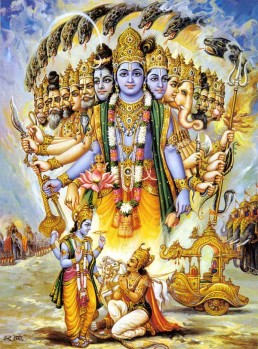Commentary
God as a father is a familiar conception in all religions. The Supreme is not to be regarded as a transcendent mystery but as close to us as a father to the son, a friend to the friend or as a lover to the beloved. These human relations find in God their fullest realization.
Swami Chinmayananda
Swami Chinmayananda Commentary
The commentary on this verse and the rest, is avaialble for free as:
Kindle eBook
Google Play Book
Apple Books
Adi Sankara Commentary
Tasmat, therefore; pranamya, by bowing down; and pranidhaya kayam, prostrating, laying, the body completely down; prasadaye, I seek to propitiate; tvam, You; who are isam, God, the Lord; and are idyam, adorable. Deva, O God; You are Your part, arhasi, should; sodhum, bear with,i. e. forgive (my faults); iva, as would; a pita, father; forgive all the faults putrasya, of a son; and as a sakha, friend; the fautls sakhyuh, of a friend; or as a priyah, lover; forgives the faults priyayah, of a beloved.
The Bhagavad Gita with the commentary of Sri Sankaracharya – Translated by Alladi Mahadeva Sastry
Holy Geeta – Commentary by Swami Chinmayananda
The Bhagavad Gita by Eknath Easwaran – Best selling translation of the Bhagavad Gita
The Bhagavad Gita – Translation and Commentary by Swami Sivananda
Bhagavad Gita – Translation and Commentary by Bhaktivedanta Swami Prabupadha
Srimad Bhagavad Gita Chapter 11 – Verse 44 – 11.44 tasmatpranamya pranidhaya – All Bhagavad Gita (Geeta) Verses in Sanskrit, English, Transliteration, Word Meaning, Translation, Audio, Shankara Bhashya, Adi Sankaracharya Commentary and Links to Videos by Swami Chinmayananda and others – 11-44

